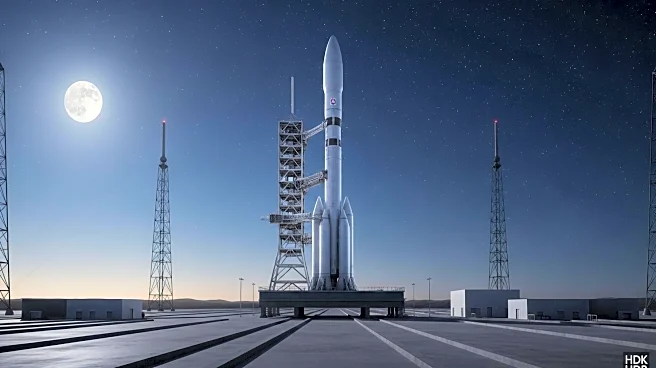What is the story about?
What's Happening?
NASA and Blue Origin have announced the reopening of media accreditation for the upcoming launch of the ESCAPADE mission, which involves twin spacecraft designed to study the solar wind's interaction with Mars. The mission aims to provide insights into Mars' response to space weather and the effects of solar activity on atmospheric escape. The launch will be conducted using Blue Origin's New Glenn rocket, marking its second mission. Media representatives interested in covering the launch must apply for credentials by October 13th, 2025. The ESCAPADE mission is part of NASA's Small Innovative Missions for Planetary Exploration program, led by the University of California, Berkeley Space Sciences Laboratory.
Why It's Important?
The ESCAPADE mission represents a significant step in understanding Mars' atmospheric dynamics and its interaction with solar wind, contributing to the broader field of planetary science. The collaboration between NASA and Blue Origin highlights the growing role of private companies in space exploration, potentially accelerating technological advancements and reducing costs. The mission's success could pave the way for future explorations and enhance our understanding of space weather's impact on planetary atmospheres. The involvement of media in the launch underscores the importance of public engagement and transparency in scientific endeavors.
What's Next?
The launch of the ESCAPADE mission is scheduled for later this fall, with specific dates to be announced. Once the launch date is confirmed, NASA and Blue Origin will provide additional details regarding media events and coverage opportunities. The mission's progress will be closely monitored, with updates posted on NASA's ESCAPADE blog. The data collected from the mission will contribute to ongoing research in heliophysics and planetary exploration, potentially informing future missions to Mars and other celestial bodies.
Beyond the Headlines
The ESCAPADE mission exemplifies the increasing collaboration between government agencies and private companies in space exploration. This partnership reflects a shift towards leveraging private sector capabilities to achieve scientific goals, potentially leading to more efficient and cost-effective missions. The mission also highlights the importance of international collaboration, as insights gained from Mars' atmospheric studies could benefit global scientific communities. The focus on space weather and atmospheric escape aligns with broader efforts to understand planetary environments and their evolution over time.















